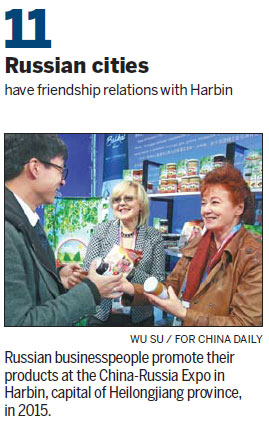Sino-Russian trade starts to takes root

Harbin will play a more significant role in promoting economic and trade cooperation between China and its neighbor, Russia.
The nearest Chinese provincial capital city to the Russian Far East is being encouraged in its quest by both strong local Russian demand for its products and favorable government policies.
Late last year, Harbin New Area was approved by the State Council to be the country's first zone to focus on China-Russian cooperation, as well as a strategic pivot to promote the Belt and Road Initiative.
This year, the Heilongjiang provincial capital received approval on March 15 for the construction of a comprehensive bonded area.
The project's first phase, covering 1.35 square kilometers, is under construction. It will be divided into five functional areas: processing, storage and logistics, research and development, exhibition and trade, and financial services.

A group of Chinese and overseas companies have already signed agreements to set up branches in the area.
Harbin has also planned an economic zone to boost the city airport's economy. Based on Taiping International Airport, the planned 51-sq-km zone will consist of 10 functional areas.
To date, the city has opened 12 passenger and cargo routes to 11 Russian cities, including Moscow, St. Petersburg, Yekaterinburg, Novosibirsk, Krasnoyarsk and Vladivostok.
On Feb 27, the first Harbin-Russia international cargo train made its debut journey from Harbin. The train, carrying 47 cargo containers, traveled nearly 5,900 km in 10 days, passing through Manzhouli Port and several Russian cities, such as Irkutsk and Chelyabinsk, to Yekaterinburg, its final destination.
With the shortest distance and the lowest cost, this route has become the best line for cargo transportation between China and Russia.
To better promote the Belt and Road Initiative, Harbin is working to build an online Silk Road and has established partnerships with Yekaterinburg, Moscow and St. Petersburg in the e-commerce sector.
In 2014, Harbin Bank launched a Sino-Russian cross-border e-commerce payment system, which supports online payment by Visa, Mastercard and more than 95 percent of Russia's mainstream payment methods. By the end of last year, the system had handled 520,000 business transactions totaling 240 million yuan ($36 million).
The bank also proposed in 2015 the foundation of a Sino-Russia financial alliance, which has 35 founding members. Currently, 12 Chinese and Russian financial institutions are waiting for approval to join.
In recent years, Harbin has been working to build a cross-border industrial processing chain that targets Russia's market demands in such sectors as equipment manufacturing, medicine and food.
It also signed strategic cooperation agreements with Russia's neighbor, Belarus.
In the China-Belarus Industrial Park, which is 25 km from the Belarus capital, Minsk, a Harbin park is under construction to serve as a springboard for Chinese companies to tap into the markets of Russia, the Commonwealth of Independent States and Europe.
As for cultural communication and exchange, Harbin hosted the first Sino-Russian Cultural Exchange Week in August last year. The Russian state symphony orchestra and the national ballet were invited to perform.
In March this year, the Harbin Conservatory of Music welcomed eight teachers from the St. Petersburg State Conservatory. They will work there for two years.
Harbin has established friendship relations with 11 cities in Russia since the 1990s and promotes trade with the country by hosting a series of festivals and fairs.
The China Harbin International Economic and Trade Fair, for example, has held 26 sessions.
The event was upgraded to the China-Russia Exposition in 2014 to focus on bilateral cooperation.
The second China-Russia Expo was held in October 2015, attracting nearly 10,000 businesspeople from 103 countries and regions, including more than 4,000 from Russia.
A variety of Russian products were exhibited at the event, with organic food such as flour, honey, beer, vegetable oil and fruit juice highlighted.
This year's event is scheduled to be held in Yekaterinburg from July 11 to 15. It will be the first time Russia has hosted the event.
Contact the writers through haonan@chinadaily.com.cn
(China Daily European Weekly 07/08/2016 page16)
Today's Top News
- Takaichi must stop rubbing salt in wounds, retract Taiwan remarks
- Millions vie for civil service jobs
- Chinese landmark trade corridor handles over 5m TEUs
- China holds first national civil service exam since raising eligibility age cap
- Xi's article on CPC self-reform to be published
- Xi stresses improving long-term mechanisms for cyberspace governance






























